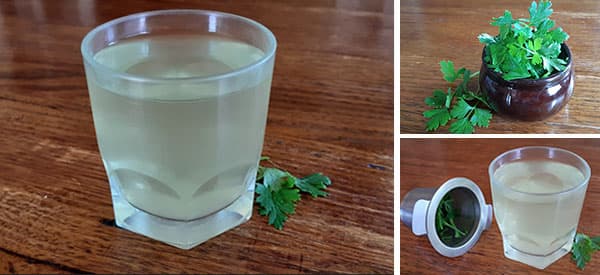
Parsley Tea for Inflammation of The Urinary Tract
Parsley is a somewhat underrated herb. Not only is it tasty, but its medicinal properties are varied. It’s easy to grow since it also self-seeds. You can harvest parsley in most climates throughout the spring and early summer. For the best-tasting parsley, prune off any flowers as they develop, otherwise leave the flowers to be pollinated by the insects in your garden and then harvest the nutritious seed instead.
Parsley Benefits and Medicinal Properties
Parsley contains an abundance of minerals and is particularly high in calcium, boron, and fluoride. The amount of vitamin A, C, and K are outstanding and it contains a decent amount of the vitamin B complex. There are a wide variety of other vitamins, flavonoids, amino acids, and terpenes as well. Of course, all of these compounds are only present when you ingest parsley. When you brew a cup of tea from fresh or dried parsley leaves, you will only ingest the water-soluble compounds.
So why choose to brew some parsley tea to help treat urinary tract inflammation? The theory is that by increasing your water intake (in the form of tea) you are potentially “flushing” out the cause of the urinary tract inflammation when you pee. And by brewing parsley tea, you will also benefit from water-soluble compounds such as vitamin C and the vitamin B complex, as well as boron and some mineral salts.
In addition to the increased water intake, parsley tea also has a natural diuretic effect, but unlike other diuretics, parsley flushes out sodium and water while potentially increasing the re-absorption of potassium.
Many studies show that parsley is a good anti-inflammatory, probably due to its vitamins and apigenin glucose, as well as a strong antioxidant. Both are great for treating any ailment.
⇒ The Common Backyard Weed That Fights Inflammation (Video)
Anti-Inflammatory Parsley Tea
Ingredients
This remedy tries to utilize as many of the water-soluble compounds as possible. Even though there are some differences between fresh and dried, concerning minerals and nutrients, they are similar enough that they can be used interchangeably.
- 1 – 2 teaspoons of dried parsley leaves/ 1 – 2 tablespoons of fresh parsley leaves
- Warm water
Method
- To preserve the vitamin C in the leaves, the water should ideally stay below 140 F (60 C). Therefore, this tea is best made in a pot on low heat on the stovetop. Of course, you can pour boiling water directly over the leaves, but be aware that this will decrease the vitamin C content.

- Brew the parsley leaves in a pot of warm water for at least 5 minutes (10 minutes will produce a stronger taste). If you are using fresh leaves and stems, then pound and mash them up a bit while they are brewing in the water. For dry leaves, simply stir.
 Strain away the leaves.
Strain away the leaves.
- Your parsley tea is ready. Enjoy!

Dosage
Drink a cup of parsley tea 3 times a day for at least 2 weeks or until the relief of symptoms.
As a preventative, drink a cup of parsley tea 1 – 2 times a week.
Conclusion
The research into parsley’s diuretic, anti-inflammatory, and antioxidant properties are well documented and it is often recommended for urinary tract and kidney issues. When consumed on a daily basis, it can even serve as a preventative, especially if you have a family history of kidney disease, or are prone to urinary tract infections.
You may also like:
 Homemade Kidney Cleanse Juice
Homemade Kidney Cleanse Juice
How Can I Prevent a Urinary Tract Infection? (Video)

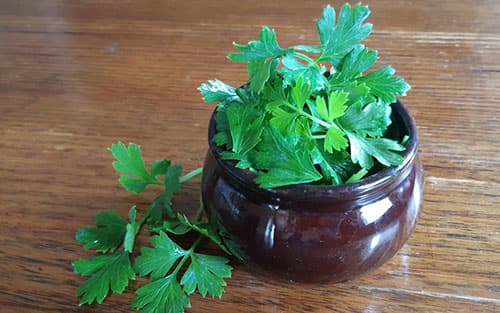
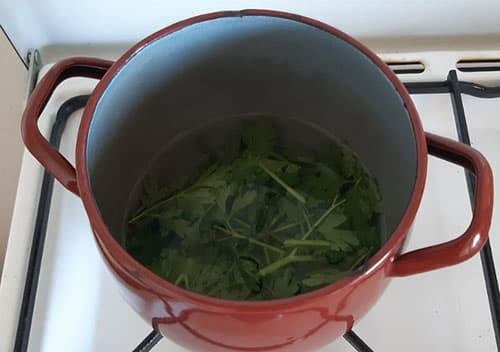 Strain away the leaves.
Strain away the leaves.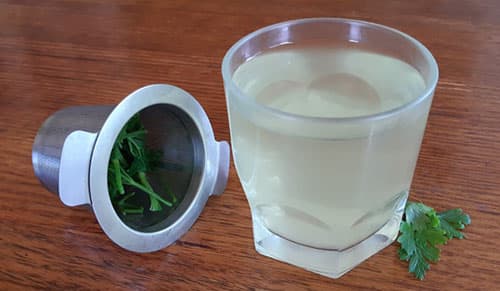
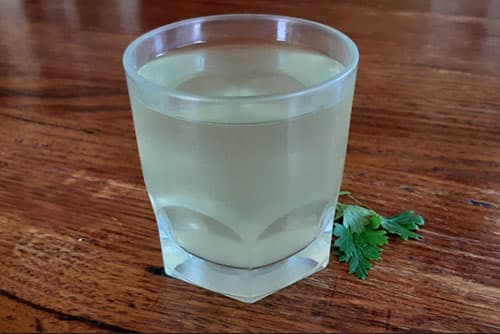
Hi, which kind of parsley works best for this? Curly or Flat leaf?
And could you make a fresh parsley tincture and have similar benefits?
As far as I know, a tincture won’t extract vitamins that are water soluble.
Hello Crystal,
If you prefer a stronger and smoother flavor, you should use Flat-Leaf Parsley.
Parsley Tincture acts as a digestive tonic and breath freshener. It promotes healthy skin and hair, it’s mildly cleansing and it increases red blood cells. It has a diuretic effect and can reduce bladder and urinary tract inflammation.
Many blessings and good health!
Thank you so very much for sharing this with us! I’m on my way to find these ingredients at my friut and vegetable store…I always use organic whenever I can!
Hello Sarah,
Thank you for your comment! We are happy to hear you enjoy our articles.
Organic fruits and vegetables are indeed a better choice.
Many blessings and good health!
Parsley tea is also very good allergy related laryngitis. Every time my daughter gets near mold or the smell of Lavender she loses her voice. Within less than 5 minutes of drinking parsley tea, she can talk again.
Hello Vicki,
Thank you so much for your post! We appreciate you sharing this with us, and we’re really happy to hear that parsley alleviates your daughter’s laryngitis.
Many blessings and good health!
Hello Nicole, I noticed that parsley is not mentioned in LBHR. Would parsley tea help with gout?
Hello Phil,
Parsley is an acid-alkaline food that is beneficial for your body’s pH level, making it good for gout.
Other beneficial herbs are stinging nettle, ginger, turmeric, dandelion, cherry, cinnamon and many others.
Many blessings and good health!
Would parsley tea help with kidney stones and/or what would be recommended?
Hello Iris,
Parsley’s anti-inflammatory properties, as well as its ability to regulate urinary pH and lower blood pressure, may help keep your kidneys healthy and reduce your risk of kidney stones.
Many blessings and good health!